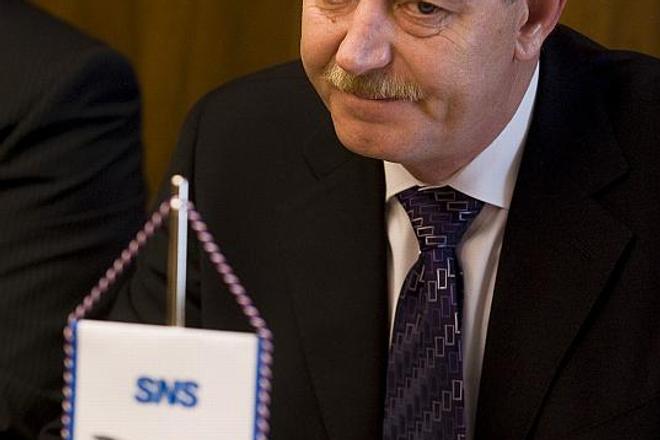AFTER much prodding, Slovakia’s environment minister has agreed to disclose details of a contract which appears to have come as a stroke of genius – or something else – for a newly-formed company that was able to buy excess emission quotas from Slovakia for only two-thirds of the price the firm would have been charged by the Czech Republic or Ukraine. Environment Minister Ján Chrbet, a nominee of the Slovak National Party (SNS), a junior member of the ruling coalition, has been showered with criticism for both the sale itself and his reluctance to disclose details of the contract after the opposition Slovak Democratic and Christian Union (SDKÚ) party claimed that Slovakia probably lost tens of millions of euros on the deal.
Interblue Group, a company registered in the United States just a few months before the contract was signed, bought 10 million excess tonnes of emission quotas from Slovakia at a price of €6.05 per tonne.
Prime Minister Robert Fico ordered Chrbet to disclose the terms of the contract on April 25.
“If it turns out that the minister of the SNS, who is in charge of the matter, has proceeded contrary to the law, he will be recalled,” Fico told TV newschannel TA3.
Chrbet's SNS colleague, Construction Minister Ivan Štefanov, faced similar pressure from Fico to kill the infamous bulletin-board contract over which the European Commission brought an infringement proceeding against Slovakia (see story top right).
However, by April 29 neither the media nor critics of the deal had had a chance to peek into the contract since Minister Chrbet argued that he needed permission from Interblue Group to disclose the details.
Radovan Kazda of the Conservative Institute think tank said that some serious questions are emerging over this lack of transparency.
“It all indicates that the sale really took place under non-transparent conditions, which is without a public tender and publishing of the sale conditions,” Kazda told The Slovak Spectator. “This is indeed the least transparent way to sell a product which is owned by the state. In fact we can mark it as a corrupt proceeding on the part of the ministry.”
The SDKÚ's 17 quota questions
SDKÚ MP Ivan Mikloš said that not only did the sale lack transparency and that the price was too cheap but that the emission quotas were not sold to another state government even though some were interested in buying. Subsequently, Pavol Frešo of the SDKÚ published 17 questions in the media pertaining to the sale of CO2 emission quotas.
He, among others, asked the ministry how many states and private firms had indicated interest in buying Slovakia’s unused quota. The minister claimed that he had been in discussion with 10 firms which were interested in the deal and Frešo wants to know more details about these negotiations.
“This business is beginning to smell like something reminiscent of the worst nightmare that Slovakia experienced with regard to the selling-off of assets, as in the privatisation of state property from 1994 to 1998,” Frešo said, as quoted by the SITA newswire. At that time the state’s assets were sold to buyers selected in advance, at depressed prices; they later sold the assets on to others, he added.
Frešo said that Interblue Group is a speculative firm.
According to the Trend business weekly, Interblue Group was registered in Washington State in the US in June 2008, shortly before the purchase of the quotas. The company’s website was created by Michal Šušoliak, a 21 year-old Slovak student at the Slovak University of Technology and son of Miloš Šušoliak, a representative of three companies active in the environmental sector, Sme wrote.
As for Chrbet’s reluctance to disclose the details of the deal without approval from Interblue Group, Grigorij Mesežnikov, president of the Institute for Public Affairs think tank, referred to the 2001 Freedom of Information Act.
In his opinion, its provisions guaranteeing the public access to most kinds of government information carry much greater weight than any provision in the contract.
Chrbet’s spokesperson Jana Kaplanová said on April 27 that the contract contains a clause of confidentiality toward third parties and that the ministry might be penalised if the clause is violated.
“The minister cannot refer to such provisions if there is a law which orders state bodies to publish information pertaining to state finances and state policies,” Mesežnikov told The Slovak Spectator.
According to Mesežnikov, there are very strong suspicions that the American firm is only a cover for SNS clients.
“Just as in the [bulletin-board] tender, the SNS is using its position of power to benefit its clients and to strengthen their political position,” Mesežnikov said.
The political analyst said that any minister who permits such practices should resign and Mesežnikov does not doubt that Chrbet knew about the way in which the quotas were sold. He added that such a minister loses his qualification to serve in a country which operates under the rule of law and moreover holds membership in the EU.
Michaela Stanková contributed to this report



 Minister Ján Chrbet (source: TASR)
Minister Ján Chrbet (source: TASR)